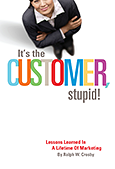Treat The Media As Customers
Among every organization’s most important customers are the media. As I recently explained in a speech before the Maryland Chapter of PRSA (Public Relations Society of America):
“The media are your customers, so treat them like it. Cater to their needs. Build lasting relationships. Be honest. Forgive their trespasses, even though they won’t always forgive yours. You have much to gain or much to lose. Believe me, I know; I’ve been on both sides of the relationship.
“As a reporter, I wrote stories that praised and stories that pilloried, and as a marketer I’ve seen my clients both praised and pilloried. Sometimes they didn’t rate the former and didn’t deserve the latter. But, through it all, the one thing I learned is that if you treat the media as a customer, you’ll get more praise than pain.”
Building relationships with reporters, editors, publishers, bloggers, etc., builds trust which, in turn, improves your chances of favorable media coverage. Of course, you must be a trusted resource as well. It’s not a one-way street.
Journalists are human beings, with personalities, sensitivities, and a job to do. Work on building a professional, yet human, relationship with them. Try to get on a first-name basis. Know the position and responsibilities of your media contacts, and know what subjects interest them and their media outlet. Exchange thoughts, problem areas, and even disagreements, especially when there’s no hot issue going on. Show appreciation for their work when it’s good. Discuss problem areas in a diplomatic but firm manner when there’s been an error. Work on building this relationship now, and the rewards will come later.
During my talk, one PR professional commented that she had learned a valuable lesson when she sent an editor a release that had no connection to his publication. He chastened her for not knowing his publication and its subject matter. It proves my point that you must treat the media like all customers and know their wants and needs.
(For more on the subject of media as customers, see my book, “It’s The Customer Stupid. Lessons Learned In A Lifetime Of Marketing.”)

 Businesses often are started by entrepreneurs with an idea, a product or service, or an expertise. Many of them fail, not because the idea or product isn’t good, but because their attention is overwhelmingly directed internally – e.g., what goes into the product – when they should focus externally, always reminding themselves:
Businesses often are started by entrepreneurs with an idea, a product or service, or an expertise. Many of them fail, not because the idea or product isn’t good, but because their attention is overwhelmingly directed internally – e.g., what goes into the product – when they should focus externally, always reminding themselves:
